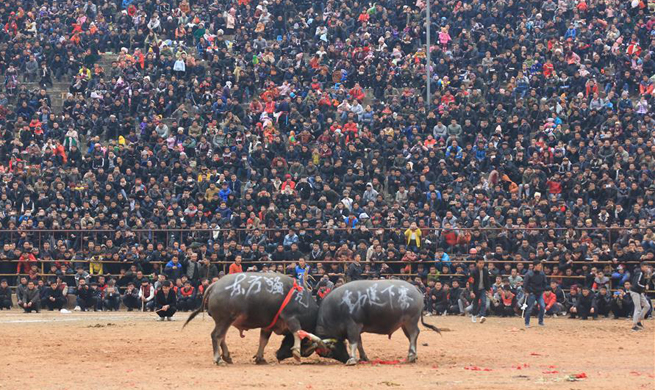by Xinhua writer Wang Bowen
JERUSALEM, Feb. 11 (Xinhua) -- Experts believe that recent friction between Israel and Syrian army forces shows Iran might have changed "rules" on its strategy towards Israel but situation is unlikely to develop into a full-fledge war.
The Israeli army launched a large-scale attack against the Syrian aerial defense system and Iranian targets in Syria after an Israeli F-16 fighter was hit by missiles from Syria and crashed Saturday morning.
Twelve Iranian and Syrian targets inside Syria were attacked, including four Iranian targets that are part of Iran's military establishment in Syria and eight Syrian targets near Damascus, said the IDF spokesperson, Lt. Col. Jonathan Conricus, in a briefing held Saturday noon.
Israel has been reportedly conducting regular intelligence fly-overs and carried out several air attacks against Syria military targets and Hezbollah targets.
Since last December, airstrikes have been more frequent than usual.
On Sunday Israel announced its plan to hold the largest paratroop drill since 2012, amid heightened tensions on both the southern and northern borders. The whole of the Paratroopers Brigade will parachute in full gear, including heavy weapons, as part of the exercise.
On Tuesday, Israeli Prime Minister Benjamin Netanyahu was joined by members of the powerful 10-member security cabinet for a briefing on Mount Avital that outlined Israel Defence Forces (IDF) readiness to tackle the ongoing threat posed by Hezbollah and other Iran-backed forces along the northern border.
On that trip the hawkish leader sent a warning message to Iran, saying "do not test Israel."
On Wednesday, Israeli fighter jets launched attacks on military targets on the outskirts of Damascus, most of which was rejected by Syrian anti-aircraft fire, triggering air raid sirens in the Golan Heights and upper Galilee, warning residents of potential rocket strikes.
It is reported that Israel also launched at least three missiles toward Syria since December.
Yossi Kuperwasser, former head of the IDF's Intelligence Research and Assessment Division and former director-general of the Ministry of Strategic Affairs, said Iran attempts to change the "rule of games" between Iran and Israel.
"Iran now intends to launch attacks from Syria against Israel by themselves instead of through Hezbollah infrastructure, Druze and Palestinian elements before," Yossi said.
Media reports say Israel has asked for immediate Russian and American intervention but foreign ministry spokesman did not respond to interview request on that.
Netanyahu warned many times that Israel will not tolerate Iranian military presence in Syria and has been repeatedly asking Putin and other international leaders not to allow Iran gain a permanent military presence in war-torn Syria.
In Washington, President Donald Trump's administration has backed Israel's hawkish stance on Iran, and declared containing Tehran's influence an objective of its Syria policy. On a visit to Israel last month, U.S. Vice President Mike Pence called Iran the world's "leading state sponsor of terror."
For Moscow, despite Netanyahu's frequent request to Putin asking for constraint on Iran both before and after his trip to Moscow at the end of last month, Russia has not rendered support for Israel.
The Russian Foreign Ministry said on Saturday shortly after the strikes that Moscow is seriously concerned by the latest developments in Syria and calls on sides to exercise restraint and avoid an escalation of the situation.
While Kuperwasser believes whether the status quo could flare up into a full war remains "hard to say," Reuven Ben-Shalom, a former Air Force pilot who served in the IDF for 25 years, said the friction is just a "skirmish."
Ben-Shalom believes neither Israel nor Iran has any interest to escalate this, adding that both sides are just trying to flex their muscles to demonstrate their own capabilities although what Iran has put together in Syria is no comparison to Israel.
A pro-Assad official, while saying the downing of F-16 fighter jet was just a "message" delivered to Israel, believes that tensions would not develop into a regional war.


















